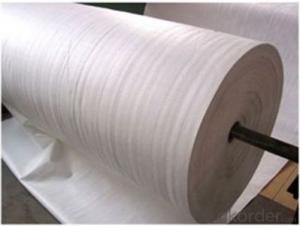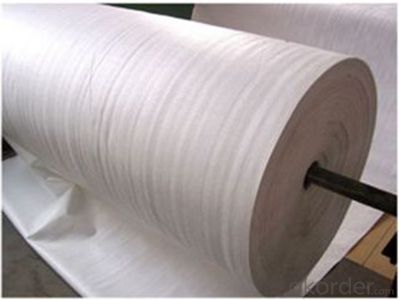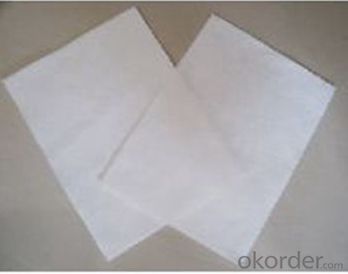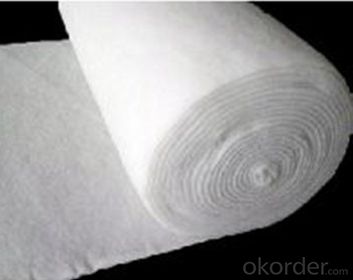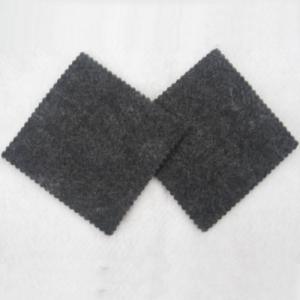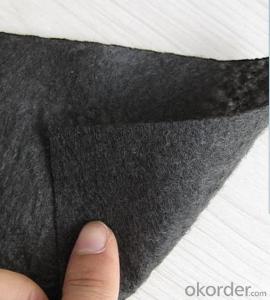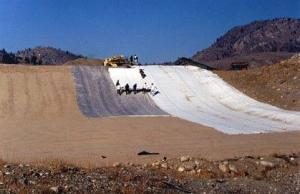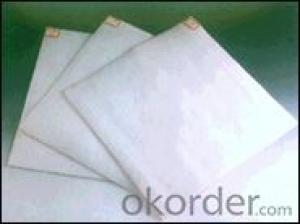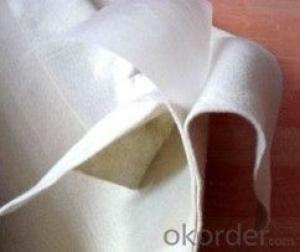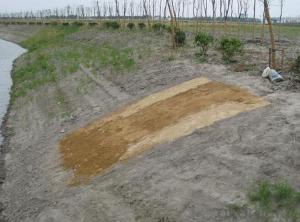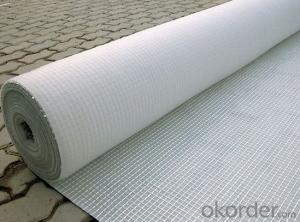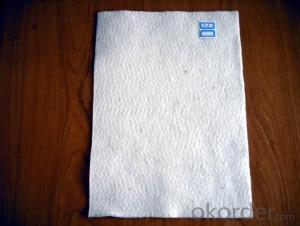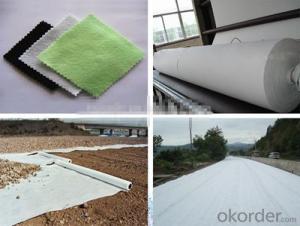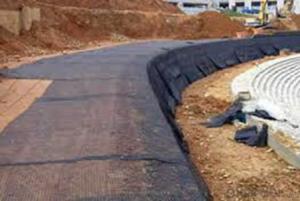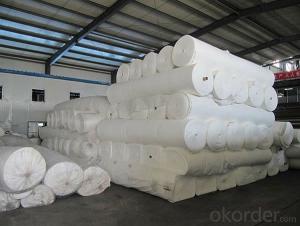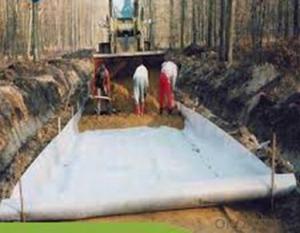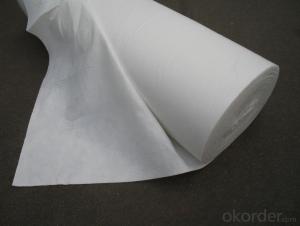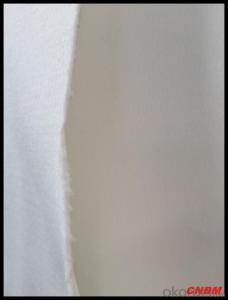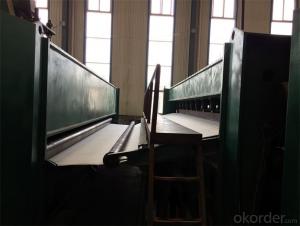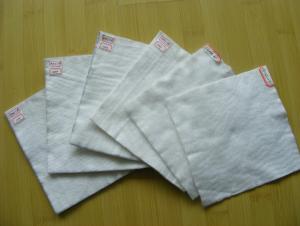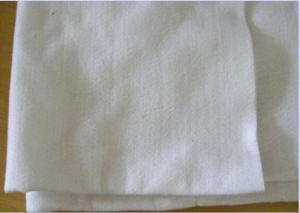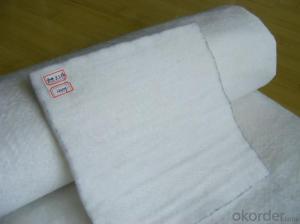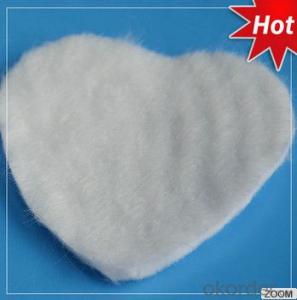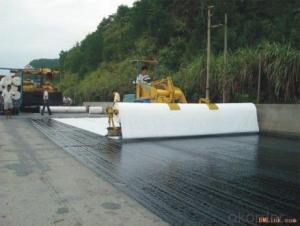Subgrade Geotextile - Thermal Bonded Non-Woven Geotextile for Highway, Railway, Dam
- Loading Port:
- China main port
- Payment Terms:
- TT OR LC
- Min Order Qty:
- 1000 m²
- Supply Capability:
- 500000 m²/month
OKorder Service Pledge
OKorder Financial Service
You Might Also Like
Specification
Product Introduction
Thermal bonded Non-Woven geotextile
Browse similar products
Previous PageShort fiber needle punched nonwoven geotextile
Next Geotextile
Name: Thermal bonded Non-Woven geotextile
Num: b8004
Views 172
Details
Thermal bonded non-woven geotextile
Description:
Single or double sides thermoforming nonwoven geotextile product,adopt PP/PET/PA etc.fibers as the raw material,production process including :non-woven technique,hot rolling and bonding treatment.
Specification:
100g/-500g/
Property:
1.neat and smooth appearance,high grab strength,low elongation,resist acid and alkali,abrasion-resistant,good antibacterial property.
2.Good hydrophily/water repellency property(based upon different raw material),uniform net surface,soft and smooth hand feeling
Application:
Could be processed to ecological bag and planting bag,applied for highway,railway,dam,river bank,landscape etc.ecological environment protection engineering.Also could be used as medical sanitation nonwovens material,garment nonwovens material,daily life use nonwovens material,industrial nonwovens material,agricultural nonwovens material,national defense use nonwovens material,etc.
1.medical and sanitation nonwovens: operation gown,protection suit,disinfection cloth,respirator and disposable sanitation cloth,etc.
2.Home decoration nonwovens:wall covering fabric,table cloth,bed sheet,bedspread etc
3.Garment nonwovens:lining ,fusible interlining,flocculus,setting cotton,various synthetic leather base cloth,etc
4.Industrial nonwovens:base material,reinforced material,polishing material,filtration material,insulating material for roof waterproof coiled material and asphalt shingle,cement packing bag,geotextile,cladding cloth,etc.
5.Agricultural nonwovens:crop protection material,seeds breeding fabric,irrigation cloth,heat preservation curtain,etc
6.Ecological environment protection nonwovens:processed to ecological bag and planting bag,applied for highway ,railway,dam,river bank,landscape etc,ecological environment protection engineering
7.Other type nonwovens:space cotton,heat preservation and sound insulation material,oil sorbent mat,cigarette filter tip,tea bag,shoe material,etc
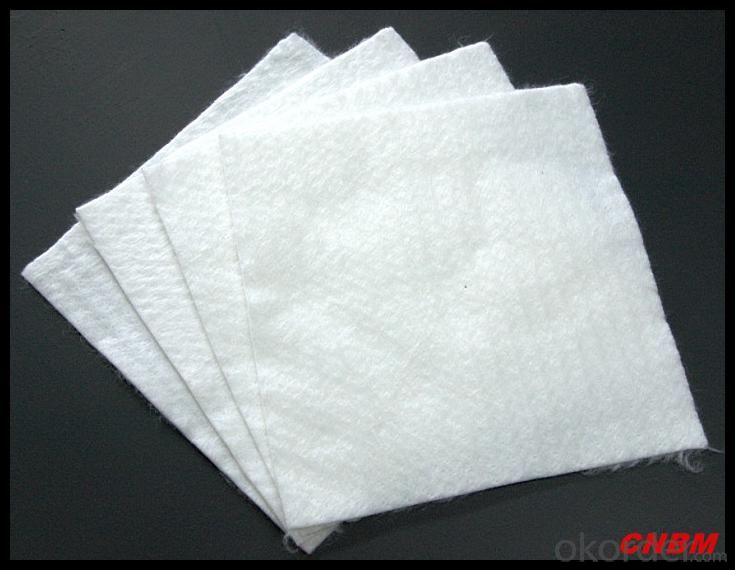
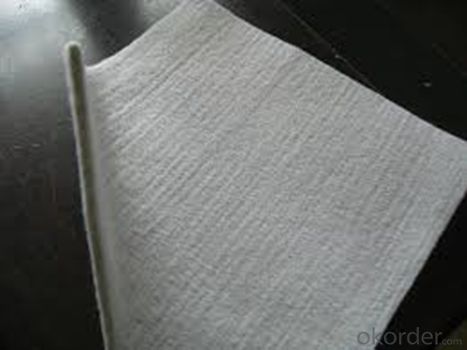
1. Specifications
1) Weight / Mass: 100g/m2-800g/m2
2) Width: Within 8 m (1m-8m)
3) Length: 50m-100m/roll (as request)
4) Material: PET
2. Features
Filament geotextile has features as follows: High strength, good capacity of elongation and high biology tolerance, alkali tolerance, acidity tolerance, weather resistance good filtration and fine drainage capacity etc. Also it is of low cost, easy in construction and use effects
3. Geotextile Applications
1) Filtration :
The filtration layer of the dykes, river canal, seacoast, concrete slope, retaining walls. At the same time of preventing the clay granule from passing, it allows the water and the gas pass through freely.
2) Separation :
The isolation of the railway dregs and the roadbed, roadbed and the soft base, surface of the airdrome and parking lot and the groundsill, different dam materials. It isolates the soil and the gravel of two kinds different granule pathway from the groundsill or other buildings.
Packaging & Shipping
Packing: PLASTIC FILM INSIDE, AND WOVEN BAG OUTSIDE
Shipping: About 15 days after receipt the deposit
pecifications
geotextile fabric
permeability,filtration,easy for construction
ISO and CE certificate
Good quality and competitive price
Our Service
Quality assurance
1.On a regular basis or as per your request,we entrust national testing agencies to conduct quality inspections
2. Strictly in accordance with the ISO9001-2008 international quality system standard,we monitor and manage the whole process throughout production,quality testing,and measurement to ensure product quality
3. For quality-related construction delay or substandard construction(except for damage or losses due to customer’s responsibility or irresistible natural disasters),we have refunding,replacement,and repair services.We will respond to customers’ feedbacks on quality issues within 24 hours.
After-sales service
1.In order to provide customers with comprehensive technical support,we will provide technical and other related information upon request in a timely manner.
2.In required,we will appoint specialized technicians to the construction site to give technical trainings to construction people,and offer technical guidance throughout the whole construction process.
3.For damage due to shipment and delivery,after we receive the complaint,we will check the issure through provided pictures and videos.If our responsibility is confirmed,we wil offer free replacement.
4.When the construction is completed,as your request,our technical staff may participate in the final acceptance.
FAQ:
Q: What kind of payments does jenor support?
A: T/T, L/C, Cash are accepted.
Q: Do you charge for the samples?
A: Accordeing to our company policy, the samples are free, we only charge the freight fee. And we will return the freight fee during the next order.
Q: Can you produce according to customers' design?
A: Sure, we are professional manufacturer, OEM and ODM are both welcome.
Q: Do you have other products?
A: Yes, please check the pictures:
- Q: How do geotextiles help with subgrade stabilization?
- Geotextiles help with subgrade stabilization by providing reinforcement and separation between different soil layers. They improve the strength and stability of the subgrade by distributing loads more evenly, preventing the mixing of different soil types, and reducing the potential for settlement and deformation.
- Q: Can geotextiles be used for erosion control in riverbanks?
- Yes, geotextiles can be used for erosion control in riverbanks. Geotextiles are permeable fabrics that can be installed along riverbanks to stabilize the soil and prevent erosion by filtering water, reducing water velocity, and promoting vegetation growth. They provide a cost-effective and environmentally friendly solution for erosion control in riverbanks.
- Q: What are the different geotextile installation techniques for roadways?
- There are several different geotextile installation techniques for roadways, including the overlay method, the trench method, and the sandwich method. - The overlay method involves placing the geotextile directly on top of the existing soil or subgrade before adding the new road material, such as asphalt or concrete. This technique helps to separate the soil layers and prevent the mixing of materials, providing stability and reducing the risk of road failure. - The trench method involves excavating a trench along the road alignment and placing the geotextile in the trench before backfilling it with soil or aggregate. This technique is commonly used for drainage applications, as the geotextile acts as a filter to prevent fine particles from clogging the drainage system, while allowing water to flow through. - The sandwich method is a combination of the overlay and trench methods. It involves placing a layer of geotextile between the existing soil and the new road material, as well as placing another layer of geotextile on top of the new road material. This technique provides additional reinforcement and separation, enhancing the overall performance and durability of the roadway. Overall, the choice of geotextile installation technique depends on the specific requirements and conditions of the road project, such as soil type, traffic load, and drainage needs.
- Q: How do geotextiles help in preventing erosion around culverts?
- Geotextiles help prevent erosion around culverts by acting as a protective barrier that stabilizes the surrounding soil. They are installed to prevent soil movement and filter out any sediments, allowing water to flow freely while retaining the integrity of the soil structure. This helps to prevent erosion, maintain the stability of the culvert, and enhance its overall longevity.
- Q: Roof garden pool at the bottom with pebbles, pebbles above with geotextile, geotextile above the soil
- Should be installed drainage board it! Geotechnical material manufacturers to answer!
- Q: Geotextile 500 grams is what it means
- 500g per square meter of quality, I professional production geotextile geomembrane, wish smooth
- Q: What are the different methods of installing geotextiles?
- There are several different methods of installing geotextiles, including direct placement, trenching, and stapling. Direct placement involves unrolling the geotextile fabric directly onto the ground surface and securing it with stakes or pins. Trenching involves digging a narrow trench along the desired location and placing the geotextile fabric inside the trench before backfilling it. Stapling involves using staples or nails to secure the geotextile fabric to the ground or other surfaces. The specific method used depends on the project requirements and the intended function of the geotextiles.
- Q: What is the latest price of geotextile?
- Ask the geotextile price is too general, because the standard too much. Short wire, filament, polyester; non-standard, GB and so on. Ton price is generally between 4900-7500 yuan / ton, but the weight <200g, an increase of 100 yuan / ton; weight> 800g, an increase of 500 yuan / ton.
- Q: How do geotextiles contribute to land reclamation projects?
- Geotextiles play a crucial role in land reclamation projects by providing soil stabilization, erosion control, and drainage solutions. They are used to separate different soil layers, preventing mixing and maintaining the integrity of the reclaimed land. Geotextiles also enhance filtration and provide a stable base for vegetation growth, allowing for the successful establishment of plants and vegetation on reclaimed areas. Additionally, they aid in reducing soil erosion caused by wind or water, protecting the newly reclaimed land from degradation.
- Q: Road overhaul of the original concrete pavement after shaving asphalt, anti-cracking is geotextile or geogrid more
- Generally used in the geotextile, generally used in soft foundation reinforcement treatment; slope protection; road anti-reflective crack structure layer; drainage system; green belt
Send your message to us
Subgrade Geotextile - Thermal Bonded Non-Woven Geotextile for Highway, Railway, Dam
- Loading Port:
- China main port
- Payment Terms:
- TT OR LC
- Min Order Qty:
- 1000 m²
- Supply Capability:
- 500000 m²/month
OKorder Service Pledge
OKorder Financial Service
Similar products
Hot products
Hot Searches
Related keywords
